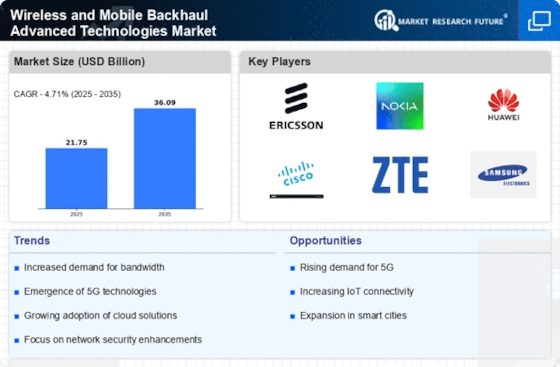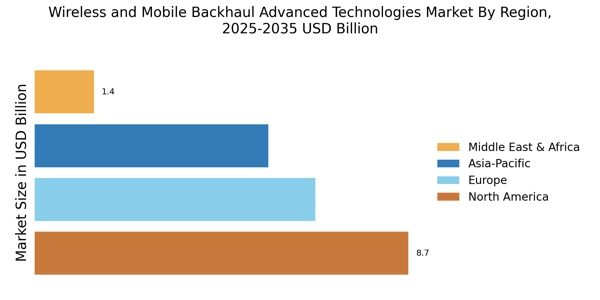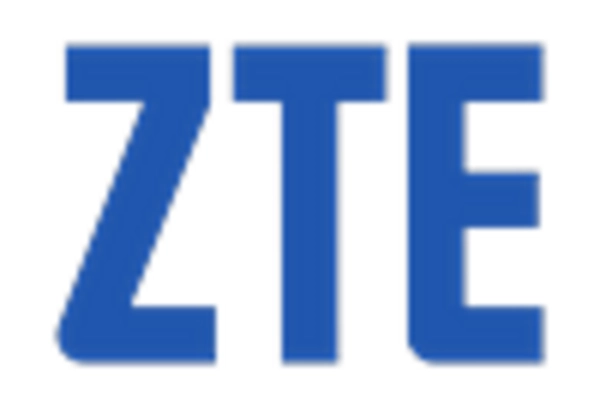Expansion of Smart Cities
The development of smart cities is significantly influencing the Wireless and Mobile Backhaul Advanced Technologies Market. As urban areas evolve into smart cities, the need for efficient communication networks becomes critical. These cities rely on interconnected systems for traffic management, public safety, and energy efficiency, all of which require advanced backhaul solutions. Recent studies indicate that investments in smart city infrastructure are expected to reach trillions of dollars over the next decade. This investment is likely to drive the demand for advanced backhaul technologies, as they are essential for supporting the vast amounts of data generated by smart city applications. The expansion of smart cities thus presents a substantial opportunity for growth within the Wireless and Mobile Backhaul Advanced Technologies Market.
Emergence of Edge Computing
The emergence of edge computing is influencing the Wireless and Mobile Backhaul Advanced Technologies Market in notable ways. As more data processing occurs closer to the source, the need for efficient backhaul solutions to connect edge devices to central data centers is becoming increasingly important. This shift is driven by the need for real-time data processing and reduced latency, which are critical for applications such as autonomous vehicles and smart manufacturing. Industry forecasts suggest that the edge computing market could grow substantially, potentially reaching hundreds of billions in value within the next few years. This growth is likely to necessitate advancements in backhaul technologies, as they play a crucial role in supporting the infrastructure required for edge computing. The rise of edge computing thus presents a compelling opportunity for the Wireless and Mobile Backhaul Advanced Technologies Market.
Rising Adoption of 5G Networks
The ongoing rollout of 5G networks is a pivotal driver for the Wireless and Mobile Backhaul Advanced Technologies Market. With 5G technology promising significantly higher speeds and lower latency, the demand for efficient backhaul solutions is intensifying. Industry reports suggest that the number of 5G connections could reach billions by the end of the decade, necessitating a robust backhaul infrastructure to support this growth. As telecommunications companies invest in 5G deployment, they are also focusing on upgrading their backhaul capabilities to handle the increased data traffic. This transition to 5G is likely to create substantial opportunities for innovation and investment within the Wireless and Mobile Backhaul Advanced Technologies Market.
Growth of Cloud Computing Services
The rise of cloud computing services is reshaping the Wireless and Mobile Backhaul Advanced Technologies Market. As businesses increasingly migrate to cloud-based solutions, the demand for reliable and high-capacity backhaul networks is growing. Cloud services require efficient data transfer and storage capabilities, which in turn necessitate advanced backhaul technologies. Recent market analyses indicate that the cloud computing market is expected to grow at a compound annual growth rate of over 15% in the coming years. This growth is likely to drive investments in backhaul infrastructure, as service providers seek to enhance their capabilities to support cloud applications. The expansion of cloud computing services thus represents a significant opportunity for the Wireless and Mobile Backhaul Advanced Technologies Market.
Increased Demand for High-Speed Connectivity
The Wireless and Mobile Backhaul Advanced Technologies Market is experiencing a surge in demand for high-speed connectivity. As consumers and businesses increasingly rely on data-intensive applications, the need for robust backhaul solutions becomes paramount. According to recent data, the demand for bandwidth is projected to grow exponentially, with estimates suggesting a compound annual growth rate of over 25% in the next few years. This trend is driven by the proliferation of smart devices and the Internet of Things, which require seamless connectivity. Consequently, service providers are investing heavily in advanced backhaul technologies to meet these demands, ensuring that they can deliver the high-speed services that customers expect. This increasing demand for high-speed connectivity is likely to propel the Wireless and Mobile Backhaul Advanced Technologies Market forward.

















